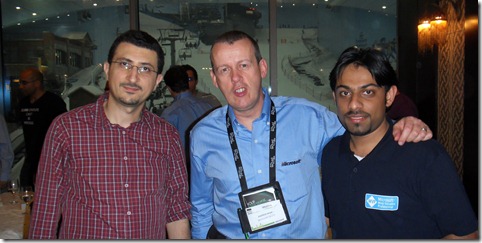TechEd Middle East 2010
Only in Dubai can you spend a balmy (25 degrees C) evening with MVP’s from UAE and Saudi Arabia overlooking a snow covered ski slope!
I was there for the first TechEd for the Middle East and while I did 3 sessions, the most interesting bit for me at an event like this is the conversations you have on the exhibition stands:
- “My Oracle dbas think Oracle is more secure than SQL Server”. I simply don’t accept this and my evidence is:
- Our internal use of SQL Server behind Microsoft.com
- SQL Server accreditation for use in the US and UK government known as common compliance criteria
- The Net. If it was broken you would have read about it.
I could argue the SQL Server is more secure than Oracle, but I would concede if you follow best practice from us and Oracle then you can make both very secure. The trouble is that not everyone does and in the case of the customer I was talking to he had to admit that he was not regularly patching Oracle with the latest security fixes. so not Oracle’s fault as such, but not secure either.
- “Should I virtualise SQL Server?” It depends on what you are looking to achieve, but you should only lose 10%-ish of the performance of the server if you follow best practice form Microsoft for Hyper-V or from your virtualisation vendor, a common theme I should mention is pass-through disks where the database resides “as is” on a SAN and is referred to in the VM as a LUN i.e. only the SQL Server binaries are virtualised. Virtual clusters can be created (and are supported) so that nodes can be patched , upgraded etc. without loss of services.
- “I want to use central management servers and policy based management servers to monitor all my SQL servers but how do I find them?” Cunning DBA’s often change the default UDP port (1433) for SQL to something else for security. There are special tools e.g.
- the SQL Server management pack for System Center Ops Manager,
- The Discovery Wizard from Quest
- Scalability Experts have a free SQL Discovery tool here.
The only things I can’t really help with are deep technical support problems for a number of reasons, not least of which is that I am not deep enough into SQL Server anymore. So I will normally refer the delegate to our excellent team of support engineers as most customers have access to this but don’t realise it (through various agreements with Microsoft and/or TechNet subscriptions).
The same applies to e-mail and comments on my blog - I’ll help if I can, but I’m out and about a lot with other commitments so replies might take some time.
